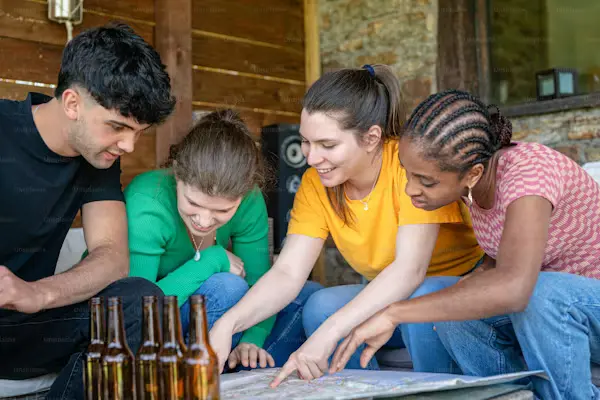Introduction
Empowering young people to lead independent and fulfilling lives is at the heart of semi-independent living. For young individuals transitioning from care, the journey towards independence is fraught with challenges, but it is also a time of tremendous growth and opportunity. A crucial part of this journey involves the development of essential life skills that equip young people to navigate adulthood with confidence and competence. This blog will explore skills development in semi-independent living, highlighting how these skills empower young people to take control of their futures.
The Role of Skills Development in Semi-Independent Living
Skills development is a cornerstone of semi-independent living. It involves teaching young people the practical, emotional, and social skills to live independently. Unlike traditional care environments where many decisions are made for them, semi-independent living encourages young people to take responsibility for their own lives. This shift requires a comprehensive approach to skills development, ensuring that young people are prepared to meet the demands of adulthood. Skills development in semi-independent living is not a one-size-fits-all process. It is tailored to each young person’s needs, considering their background, experiences, and future goals. This personalised approach ensures that each young person receives the support they need to develop the skills most relevant to their circumstances.
Practical Life Skills
The foundation of independent living lies in managing day-to-day tasks effectively. Practical life skills are essential for young people transitioning from care to independence. These skills include: Budgeting and Financial Management: Understanding how to manage money is critical for independence. Young people in semi-independent living learn how to create and stick to a budget, manage expenses, save for the future, and avoid debt. They are taught the importance of financial planning, including handling unexpected expenses and making informed financial decisions.
Cooking and Nutrition:
Preparing healthy and balanced meals is another key aspect of independent living. Young people are provided with basic cooking skills, meal-planning techniques, and an understanding of nutrition. This not only helps them maintain a healthy lifestyle but also encourages self-reliance.
Household Management
Maintaining a clean and safe living environment is crucial for well-being. Skills such as cleaning, laundry, and essential home maintenance are taught to ensure young people can care for their own space. This also includes understanding tenancy agreements and knowing how to handle situations like repairs or disputes with landlords.
Time Management:
Effective time management is essential for balancing the various responsibilities of adult life, including work, education, and personal time. Young people are guided on prioritising tasks, setting achievable goals, and managing their time efficiently. This skill is particularly important for those pursuing further education or employment.
Emotional and Social Skills
While practical skills are essential, independence requires strong emotional and social skills. These skills enable young people to build healthy relationships, cope with challenges, and thrive in social settings. In semi-independent living, young people are supported in developing the following:
Emotional Resilience:
Life is full of ups and downs, and building emotional resilience is crucial in navigating these challenges. Young people learn to cope with stress, manage their emotions, and seek help when needed. This includes developing strategies for dealing with difficult situations, such as conflict resolution and stress management techniques.
Communication Skills:
Effective communication is vital in all areas of life. Young people are taught to express themselves clearly, listen to others, and interact positively. These skills are crucial for building and maintaining relationships, whether in a personal, educational, or professional context.
Problem-Solving and Decision-Making:
Independence often involves making decisions and solving problems daily. Young people are encouraged to develop critical thinking skills, which help them to evaluate situations, consider different options, and make informed decisions. This includes learning how to assess risks and weigh the potential outcomes of their choices.
Building Healthy Relationships:
Healthy relationships are essential for a fulfilling life. Young people are supported in understanding the dynamics of relationships, including the importance of boundaries, respect, and effective communication. They are also encouraged to build positive social networks, which can provide support and companionship as they navigate adulthood.
Educational and Vocational Skills
Education and employment are vital components of independence. Semi-independent living programs often focus on developing educational and vocational skills to ensure that young people are well-prepared for the future.
Educational Support:
Support is provided to help those still in education succeed academically. This can include tutoring, study skills workshops, and guidance on further education options. Young people are encouraged to set educational goals and are supported in achieving them through school, college, or vocational training.
Career Guidance and Vocational Training:
Preparing for the workforce is critical to becoming independent. Young people are offered career guidance to help them identify their interests and strengths, explore career options, and develop the skills needed to succeed in their chosen field. This may include job search assistance, resume writing workshops, interview preparation, and access to vocational training programs.
Work Experience and Internships:
Practical work experience is invaluable for young people preparing to enter the job market. Opportunities for internships, apprenticeships, or part-time work are often provided, allowing young people to gain real-world experience and develop a strong work ethic.
The Impact of Skills Development on Empowerment
Skills development in semi-independent living does more than just prepare young people for the practicalities of adult life; it empowers them to take control of their futures. By learning essential life skills, young people gain the confidence and competence to make informed decisions, overcome challenges, and achieve their goals. Empowerment is about giving young people the tools they need to succeed and fostering a sense of self-worth and agency. When young people develop skills that allow them to live independently, they see themselves as capable and resourceful. This shift in self-perception is crucial for long-term success and well-being. In addition, the sense of empowerment from skills development extends beyond the individual. As young people become more confident and capable, they can better contribute to their communities and build positive relationships with others. This creates a ripple effect, where the benefits of empowerment are felt by the young person and those around them.
Conclusion
Empowering young people through skills development is a fundamental aspect of semi-independent living. By providing young people with the practical, emotional, and social skills they need to succeed, we are helping them build a future where they can thrive as independent adults. At Destiny Care Home Ltd, we are committed to supporting young people on this journey, ensuring they have the skills, confidence, and empowerment needed to achieve their full potential.




